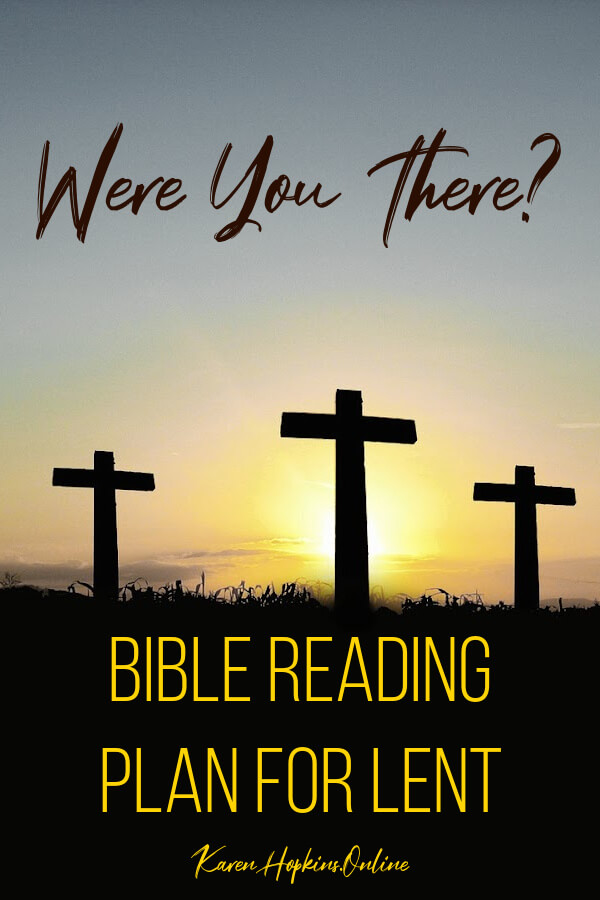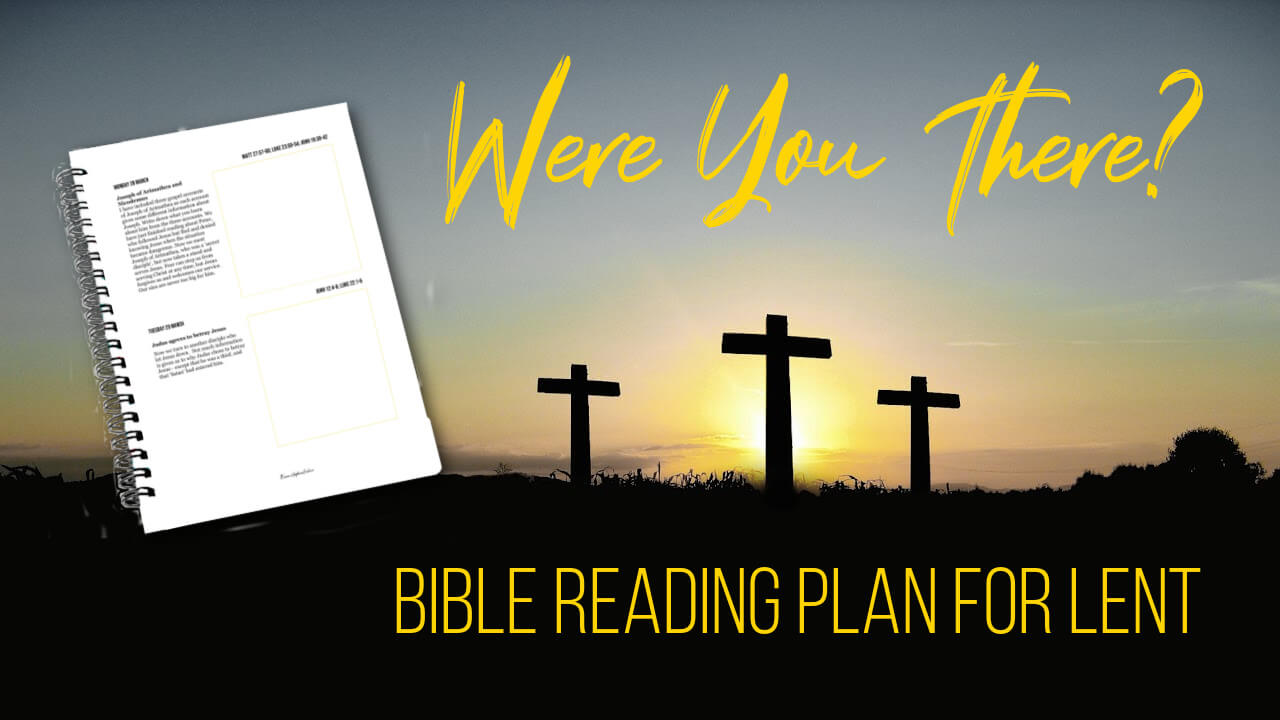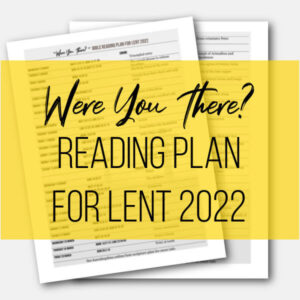Bible Readings for Lent
‘Were You There?’ – Bible Readings for Lent
Many years ago, long before I started to teach Bible Study or make my own Bible Reading Plans, I had an idea that a study focused on the people who were involved in the story of Easter would be a great idea for a Bible Study, or Scripture Plan for Lent. As I dreamed about this idea I immediately knew what I would call it – ‘Were You There?’ after the African-American Spiritual Hymn that I had sung in the school choir. Now, all these years later, the dream has become a reality and I have put together all the experiences of the people at the cross into my study: Were You There? Bible Readings for Lent. And it has been updated for 2022!
What is Lent?
The period between Ash Wednesday and Easter Sunday is known as Lent in the Christian church. Different denominations have varying traditions during this period, but they usually involve solemn reflection in the lead up to Good Friday and Easter Sunday. This time often includes a time of self-denial (giving up a luxury or habit), repentance of sins, prayer and participating in daily Bible reading.
The period of 40 days is to remember Jesus’ 40 days in the wilderness. In the church I grew up in, the 40 days were calculated from Ash Wednesday until Easter, but not including Sundays – Sundays are a day of celebration I was told!
The ‘Were You There?’ Bible Readings For Lent
In these Bible verses for Lent, as we lead up to Easter, I have taken the accounts from Jesus’ entry to Jerusalem until his ascension and looked at the passages from the point of view of the different people involved.
The Chief Priests, Romans, Disciples, Women and the crowds all have quite different opinions of Jesus and experiences when dealing with him or observing the events. By taking each group, one at a time, and focusing on their interpretation of the events I believe we get drawn into the text. Much like the intent of the hymn ‘Were You There?’
As we journey through the Bible Reading Plan, we will visit the different events many times – so I pray this will be an enriching experience rather than a confusing one! Since I had four Gospels to choose from I was able to select different passages for each day, even though the events are repeated.
While reading the Bible verses, therefore, it is important to remember which group of people, or person, is the focus for that day.
You can join me in these Bible Readings for Lent by completing the form below to download the free two-page Scripture Plan.
Using the ‘Point of View’ Study Method
There are various methods we can use to gain insight into Biblical texts. Often they give us insight into what is happening in the passage or why it is happening (maybe with some insight gained from historical or cultural information). Another method is to look at how the text has been written as this can also give us a greater understanding of the message the author was conveying – and since I believe that all Scripture is inspired by God, this really means the message that GOD is conveying.
This narrative study method was one of my favourite when I was at Bible College, since a) I love a good story! and b) you don’t need lots of additional resources like Bible dictionaries, concordances and commentaries – just keep looking into the text.
One example of this method is to look at the Point of View that the author is using in his telling of the story.
- Whose point of view are we seeing the events from?
- How much of their point of view does the author give us?
- Do we just observe what they are doing and saying, or do we get a closer perspective and learn what they are seeing and thinking?
- How does this influence what we know about the events and the characters?
All of this should help us to identify with the characters, gain a better understanding of the text and how we should apply what we have learned to our lives.
As you go through these Bible Readings for Lent try to identify what you can learn from the point of view of the person or group of people that are the focus for that day.
(One final note about using literary techniques like point of view to study the Bible: Just because we use words like ‘narrative’, ‘character’, ‘story’, or ‘plot’, etc. doesn’t mean we do not believe the stories to be true – it is just that they are written in a narrative style, and only parts of the Bible are written in this style).
Why are Sundays different?
The Christian tradition I grew up in (the Protestant Church of Scotland) counted the 40 days of Lent from Ash Wednesday until Easter Sunday, excluding Sundays. I remember as a child being told that this was because Sundays (the day of Christ’s resurrection) were a day for celebration not fasting.
I have, therefore, decided to make Sundays a bit different in this Scripture Plan.
Instead of continuing the story looking at someone’s point of view I have taken a verse or two about Christ’s crucifixion or resurrection (either prophecy, a promise or point of praise) for us to focus on for that day. If you purchase the accompanying Study Guide there is a page set apart for each Sunday to draw or write your reflections on these verses. Check out my post on Verse Mapping for more tips on digging deeper into a verse.
The Were You There? Study Guide
I have also written a Study Guide to accompany the Bible Reading Plan. The Study Guide includes:
- An introduction to the Study Guide, with tips on how to use the guide and how to gain insight using the ‘Point of View’ Bible Study Method.
- The two page Scripture Plan with the reading for each day.
- A short description of each day’s Scripture reading, with insights and reflections to guide your reading and devotional time.
- Space to record your thoughts, prayers and reflections or to write out a verse of Scripture.
The Were You There? Study Guide also makes a great Family Devotion for Lent. Simply read the daily passages and notes together and then discuss the events from the character’s point of view.
I Pray that the Were You There? Bible Readings for Lent will bring you new insights and closer to God during the lead up to Easter.







Hello Karen,
Good job on coming up with this material that will help millions of people grow their faith.
However, I have tried to download the free page scripture but I can’t manage to do that. Please help.
Hi Salome, Thanks for the encouragement! I’m sorry there was a problem downloading the plan. You should find it in your inbox now. God Bless